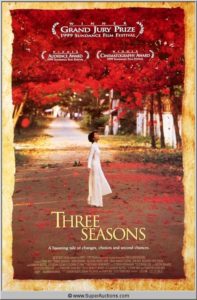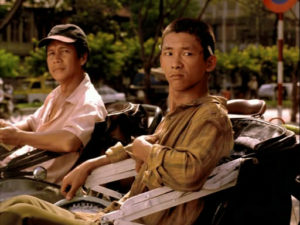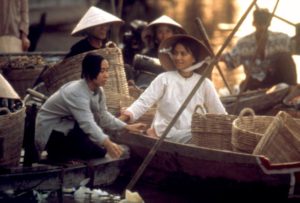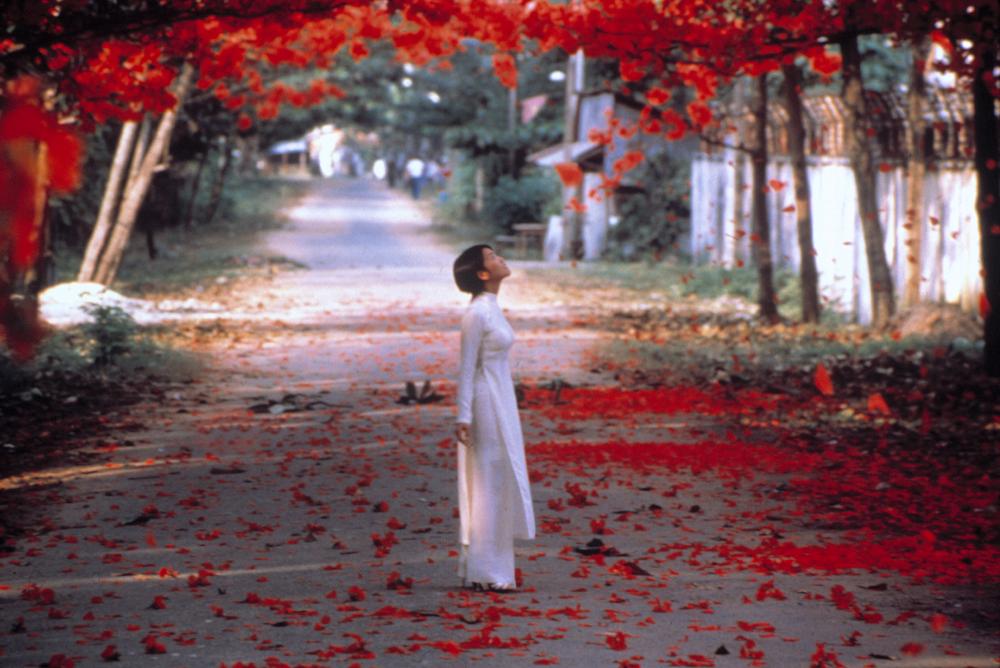Movie of the week: “Three Seasons”
 What is the first image that comes to mind when we hear about a movie about Vietnam?Stallone with a band on his head, and a .50 machine gun on his arms, or, Chuck Norris, with his face enfeeled, knocking down helicopters with a single rifle shot …Now, ladies and gentlemen, there is a movie about Vietnam where heroes are not Americans armed to the teeth, but ordinary people – not less special.
What is the first image that comes to mind when we hear about a movie about Vietnam?Stallone with a band on his head, and a .50 machine gun on his arms, or, Chuck Norris, with his face enfeeled, knocking down helicopters with a single rifle shot …Now, ladies and gentlemen, there is a movie about Vietnam where heroes are not Americans armed to the teeth, but ordinary people – not less special.
What to think of a movie that shows the disjointed stories of a young lotus picker, a leprous teacher, a taxi-bike driver, a prostitute, a lost American, and a street kid? These are the parts of the “Three Seasons” plot, the first American production shot in Vietnam after the war, and which was awarded at the Sundance Film Festival, the Mecca of independent cinema.
 There are three main stories from the film. A young woman comes from the country to be a harvester and seller of lotus flower and maintains a delicate relationship with a poet and teacher who suffers from an advanced state of leprosy, offering to write the poems he dictates. A young taxi-bike driver falls in love for a cynical luxury prostitute and manages to give him a new perspective on the world. A street boy walks through the city’s ghettos and bars trying to survive while a former US Marine spends his days sitting in front of a restaurant in search of something that belongs to his past.
There are three main stories from the film. A young woman comes from the country to be a harvester and seller of lotus flower and maintains a delicate relationship with a poet and teacher who suffers from an advanced state of leprosy, offering to write the poems he dictates. A young taxi-bike driver falls in love for a cynical luxury prostitute and manages to give him a new perspective on the world. A street boy walks through the city’s ghettos and bars trying to survive while a former US Marine spends his days sitting in front of a restaurant in search of something that belongs to his past.
The film shows a country divided between its socialist ideology and the pressing urgency of adhering to globalization. Lost in the midst of this process, the human beings who live on the bottom rung of the social ladder are the ones who suffer most in their own quest for identity and a place in the sun. This recent phase in the history of his so suffering country is counted according to its perspective, from the bottom up.
 In this apparently sordid environment, moments of rare beauty and sensibility are shown, as when the driver spends the small fortune he has won in a race to fulfill the dream of the prostitute: a quiet night’s sleep in a luxury hotel. Or when the former soldier, masterfully lived by Harvey Keitel, rediscovers his daughter after identifying her in a brothel. Or the materialization of the dream of the dying poet by the innocent lotus harvester, throwing the flowers in the river, while the sellers of the floating market sing a beautiful folk song.
In this apparently sordid environment, moments of rare beauty and sensibility are shown, as when the driver spends the small fortune he has won in a race to fulfill the dream of the prostitute: a quiet night’s sleep in a luxury hotel. Or when the former soldier, masterfully lived by Harvey Keitel, rediscovers his daughter after identifying her in a brothel. Or the materialization of the dream of the dying poet by the innocent lotus harvester, throwing the flowers in the river, while the sellers of the floating market sing a beautiful folk song.
The disenchantment with the current situation of the country is shown symbolically by the countless luminous of the multinationals, by the plastic lotus flowers, by the abandonment of childhood in the alleys and alleys of the city, and by the terrible illness of the once beautiful teacher.The poet’s physical deformation tries to portray the loss of Vietnam’s traditional culture in this war they are now losing.

The work of director and screenwriter Tony Bui, a Vietnamese-bred American, is extraordinary in bringing together elements such as poverty, prostitution, abandoned minors and incurable diseases, and even compose a poem of singular beauty and delicacy.
This is aided by the beautiful sights of the City of Ho-Chi-Min (formerly Saigon) and the beautiful music of Richard Horowitz.The only foreign actor to appear in the movie was Harvey Keitel, who also executive producer of the film. The rest of the cast is Vietnamese. This film provides a rare opportunity to see Vietnam without being warped and at the same time to show that their problems are not many different from ours.
The DVD version came in full screen format (4:3) and stereo sound, bringing as extras only the synopsis of the movie, biographies of the director and Keitel and the titling of the chapters. This is one of the rare cases where a poor form is compensated for by the richness of the content. I suggest you see it and draw your own conclusions.






